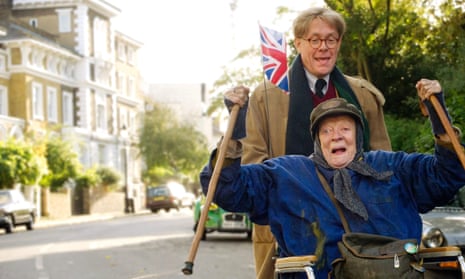The post-second world war baby boomers, we know, are the most fortunate of generations: young people struggle to get on the housing ladder while the newly retired are the wealthiest they have ever been. So it should perhaps be no surprise that in cinemas too, this generation is now making its presence felt, but after some neglect. When the UK film industry almost went under in the 70s, it was partly because baby boomers had less time to go the movies when they had babies of their own to look after. And when it was defibrillated in the following decade by the arrival of multiplexes, the same generation, now thirty-somethings, were not the reason for cinemas’ return to life.
Yet members of this generation are now turning out in large numbers. In America and Canada, 15% of over-60s were defined as “frequent moviegoers” in 2015, up from 14% the year before and 10% the year before that. It is a similar story in the UK, where between 2008 and 2015 the share of over-55s in the audience increased every year (apart from 2011), hitting a peak of 12.5% last year. As Crispin Lilly, CEO of Everyman Cinemas, says: “There is a whole generation of people who grew up with good quality cinemas before the 1980s that are now returning in droves.”
Change has been afoot over the last four or five years. In the wake of the success of The Best Exotic Marigold Hotel, films starring mature actors have been huge hits with older viewers. Research from the BFI shows that last year The Lady in the Van and The Second Best Exotic Marigold Hotel were both more than twice as popular as Spectre – one of the highest grossing films ever in the UK – with over 55s. Given the longevity of the Bond franchise, this is more than a little surprising.
More than the actual films though, it is the surrounding experience at the cinema that is pulling this generation through the doors. “Event cinema”, such as live-streamed ballet and opera, “is particularly valued” by older people, says Phil Clapp of the UK Cinema Association and, while a comfortable experience has always been part of the deal in independent cinema, comfort levels have been rising dramatically as “silver screeners” attend in greater numbers. According to Stefanie Fischer, an architect with a specialism in independent cinemas, the last three or four years have seen much higher standards of comfort in auditoria. She explains how the seat width in one cinema expanded from 550mm to 600mm and up again to 650mm in just a matter of years. Increased seat sizes, Fischer says, are also being implemented in multiplexes, which are seeing the benefits of prioritising “comfort over capacity”. An increase in depth, as well as the width, of seats means that often you now don’t have to stand up to allow others to get by on their way to the toilet.

Fischer describes how, unlike in multiplexes, independent cinemas look to create a welcoming environment for older people by making sure sound-absorbent materials are fitted into front of house areas so that customers can “hear one another without difficulty”. Outside the auditoria, “older audiences do tend to spend more money” at the concession stand than other demographics, says Lyn Goleby, managing director of Picturehouse Cinemas – so long as they are offered a wider range of refreshments than just nachos, popcorn and fizzy drinks. It may be just these kind of details that are making an evening out at the movies seem attractive to this age group once again.
As well as offering greater levels of comfort in cinemas, cinemas are also increasingly convenient for a mature audience to access. A recent report by the credit-checking company Experian showed that instead of making the traditional move to seaside resorts, a large chunk of well-to-do retirees (whom it described as “smarties”) are instead opting for market towns where they can continue to be active. As wealthy pensioners increasingly live in urban hubs, going to the movies has never been easier for them. No surprise then that Everyman Cinema chain has been buying up high street Odeons, and that almost all of its seven newly acquired cinemas are in market towns or small cities – exactly the places where more than 1.3 million of these so-called smarties are now living. This could be particularly good news for the film industry, because one of the reasons why cinema attendance plummeted in the post-war years was that young families moved into the suburbs, away from cinemas in town and city centres.
Though they are still a relatively small share of the audience, the steady rise in older cinemagoers over the past few years has coincided with a decline in UK cinema’s most reliable customers, 15 to 24 year olds, who have been heading to the silver screen less and less since 2012. Given these trends, as well as the fact that so many of the older generation still don’t go to the movies regularly, the industry may continue to switch gears in order to accommodate this promising new market.
So, are the changes in cinema design, food and location encouraging mature audiences back into the cinemas, or are these things being accommodated around them? Whichever it is, says Clapp, many older people haven’t been to the cinema in a long time. “In fact the last time they went was probably in the 1980s and that was a pretty dispiriting experience. It’s a bit of a chicken and egg thing.”

Comments (…)
Sign in or create your Guardian account to join the discussion